Syllabus For CLAT Exam | How to Study for CLAT PDF Download
| Table of contents |

|
| What is CLAT Exam? |

|
| CLAT 2026 Exam Pattern |

|
| Subject-wise Syllabus For CLAT 2026 |

|
| Important Tips for CLAT Exam Preparation |

|
| Additional Links: |

|
What is CLAT Exam?
- The Common Law Admission Test (CLAT) is a national-level entrance exam for admissions to undergraduate (UG) and postgraduate (PG) law programmes offered by National Law Universities around the country. CLAT is organized by the Consortium of National Law Universities consisting of representative universities.
- To clear all your doubts about the exam pattern and syllabus for CLAT, the experts on EduRev have compiled and summarised important information for you. Read the full details below:
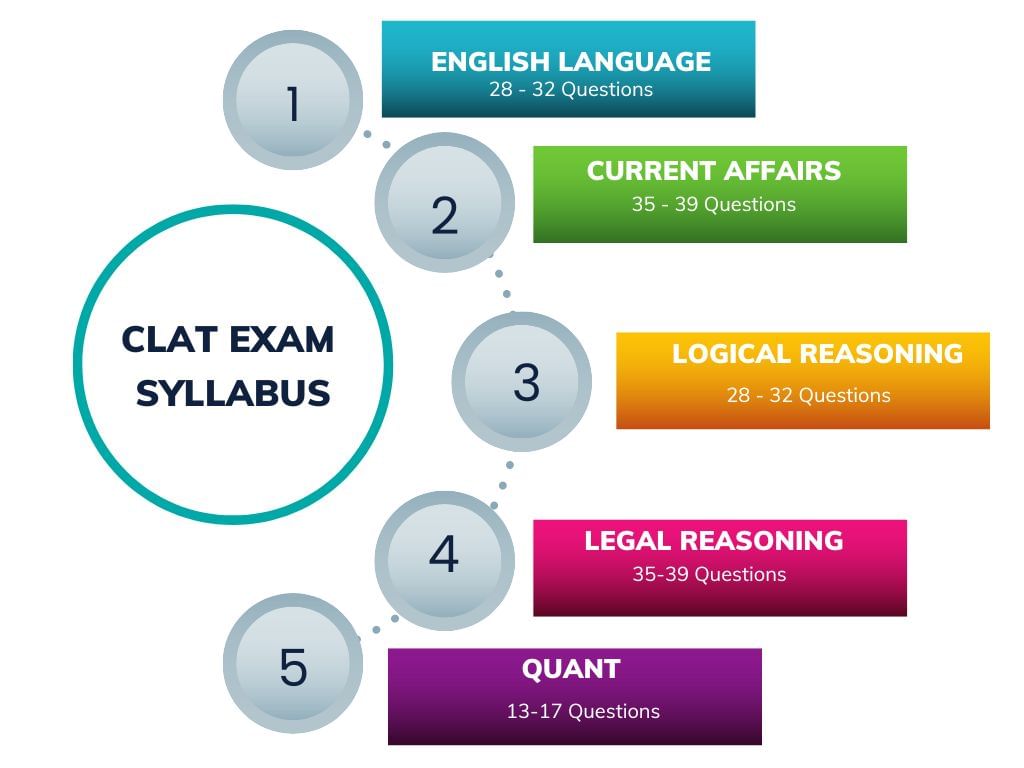
CLAT 2026 Exam Pattern
The Consortium of National Law Universities released the CLAT 2026 syllabus and revised pattern on July 1. The syllabus of CLAT 2026 is similar to the previous year's syllabus. However, the total number of questions has been reduced from 150 to 120 in CLAT UG.
CLAT Exam Pattern (UG) consists of 5 sections: English, Legal Reasoning, Logical Reasoning, Current Affairs including GK, and Quantitative Techniques, with a total exam duration of 2 hours. Tentatively, the CLAT paper pattern remained unchanged in the previous year and is expected to stay the same for this year. Here are the key details of exam pattern of CLAT UG.
 CLAT 2025 Exam Pattern
CLAT 2025 Exam Pattern
Subject-wise Syllabus For CLAT 2026
The UG-CLAT 2026 would focus on evaluating the comprehension and reasoning skills and abilities of candidates. Overall, it is designed to be a test of aptitude and skills that are necessary for a legal education rather than prior knowledge, though prior knowledge occasionally may be useful to respond to questions in the Current Affairs including General Knowledge section.
To gain a thorough understanding of each subject, the subject-specific syllabus is given below in detail:
Subject-Wise Weightage and Question Distribution:

1. English
In this section of the UG-CLAT 2026, you will be provided passages of about 450 words each. These passages will be derived from contemporary or historically significant fiction and non-fiction writing, and would be of a standard that a 12th standard student may be able to read in about 5-7 minutes.
Each passage will be followed by a series of questions that will require you to demonstrate your comprehension and language skills, including your abilities to:
- Read and comprehend the main point discussed in the passage, as well as any arguments and viewpoints discussed or set out in the passage;
- Draw inferences and conclusions based on the passage;
- Summarise the passage;
- Compare and contrast the different arguments or viewpoints set out in the passage; and
- Understand the meaning of various words and phrases in the context that they are used in the passage.
Check out the important topics of CLAT English from the table below:
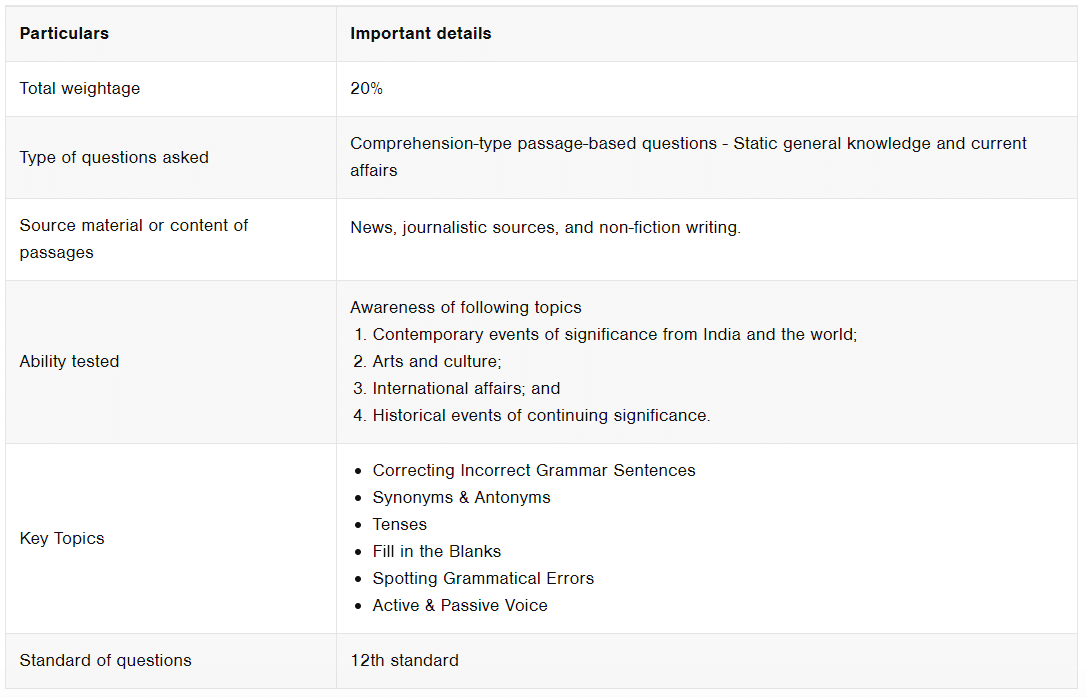
At EduRev, we have compiled all the topics that you should be familiar with from the English grammar portion. Along with this, you’ll find a series of tests specially designed by the experts for your practice of English for the CLAT section.
2. Current Affairs Including General Knowledge
In this section, you will be provided passages of up to 450 words each. The passages will be derived from news, journalistic sources and other non-fiction writing. The questions may include an examination of legal information or knowledge discussed in or related to the passage, but would not require any additional knowledge of the law beyond the passage.
Each passage will be followed by a series of questions that will require you to demonstrate your awareness of various aspects of current affairs and general knowledge, including:
- Contemporary events of significance from India and the world;
- Arts and culture;
- International affairs; and
- Historical events of continuing significance.
Check out the important topics of CLAT Current Affairs including GK from the table below:
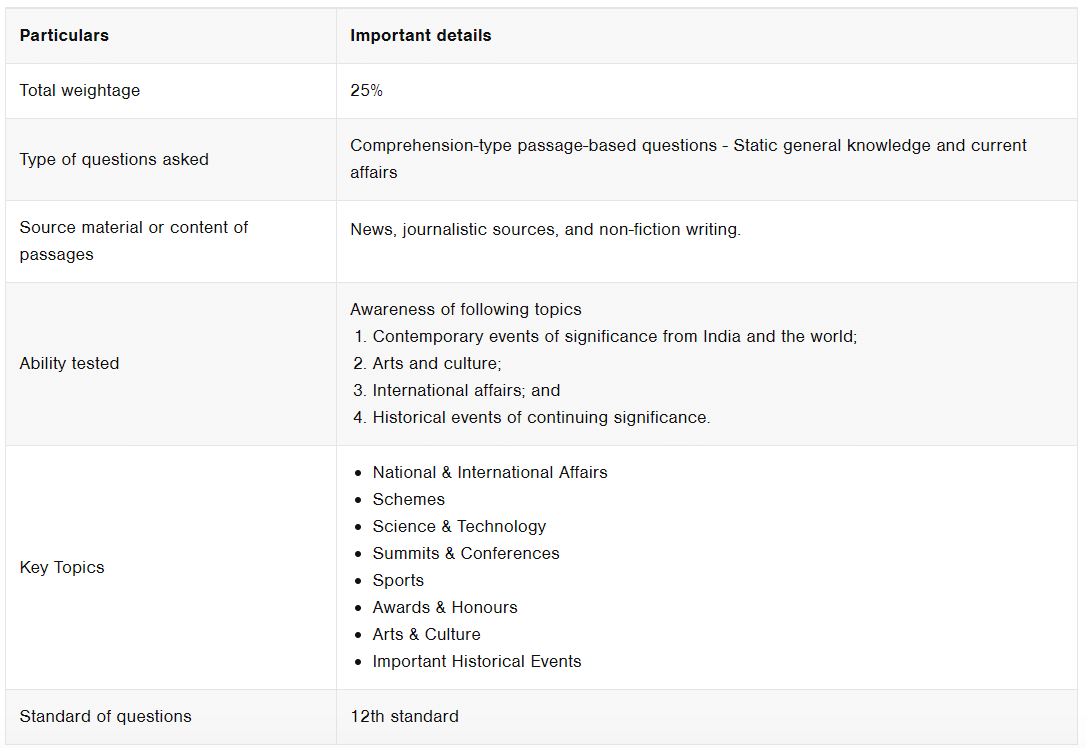
At EduRev, we have compiled all the topics that you should be familiar with for your Static General Knowledge as well as Current affairs.
3. Legal Reasoning
In this section, you will be expected to read passages of around 450 words each. The passages may relate to fact situations or scenarios involving legal matters, public policy questions or moral philosophical enquiries. You will not require any prior knowledge of law to attempt the questions in this section. You will benefit from a general awareness of contemporary legal and moral issues to better apply general principles or propositions to the given fact scenarios.
Each passage would be followed by a series of questions that will require you to:
- Identify and infer the rules and principles set out in the passage;
- Apply such rules and principles to various fact situations; and
- Understand how changes to the rules or principles may alter their application to various fact situations.
Check out the important topics of CLAT Legal Reasoning from the table below:
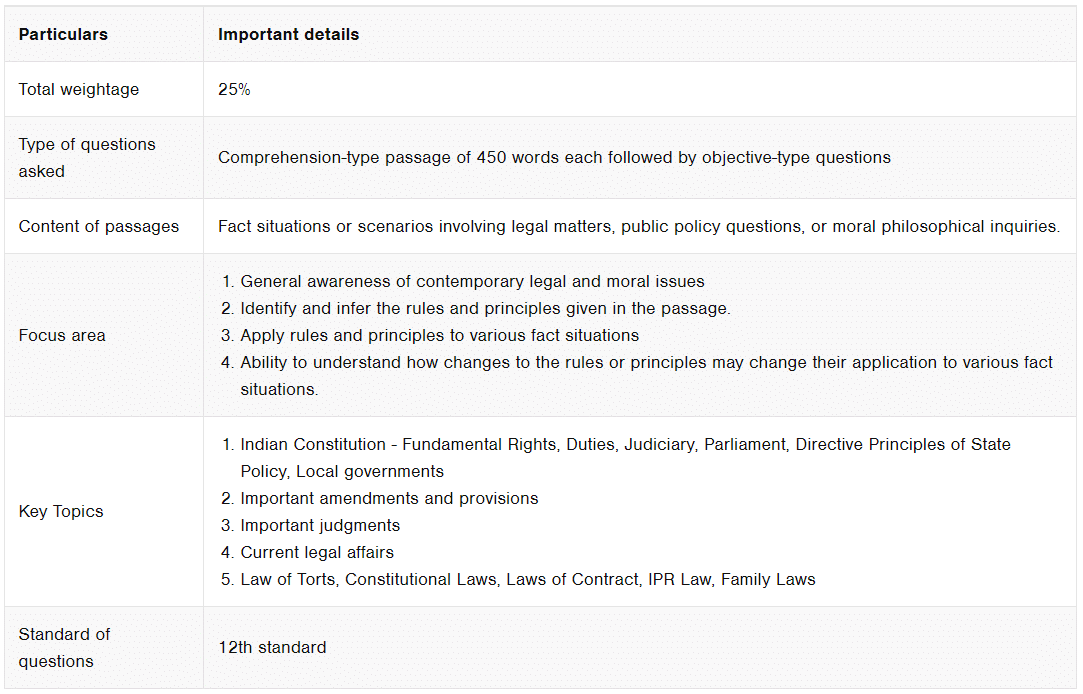
At EduRev, we have compiled all the topics that you should be familiar with for your Legal reasoning portion.
4. Logical Reasoning
The Logical Reasoning section of the UG-CLAT 2026 will include a series of short passages of about 450 words each. Each passage will be followed by one or more questions that will require you to:
- Recognize an argument, its premises and conclusions;
- Read and identify the arguments set out in the passage;
- Critically analyze patterns of reasoning, and assess how conclusions may depend on particular premises or evidence;
- Infer what follows from the passage and apply these inferences to new situations;
- Draw relationships and analogies, identify contradictions and equivalence, and assess the effectiveness of arguments
Check out the important topics of CLAT Logical Reasoning from the table below:
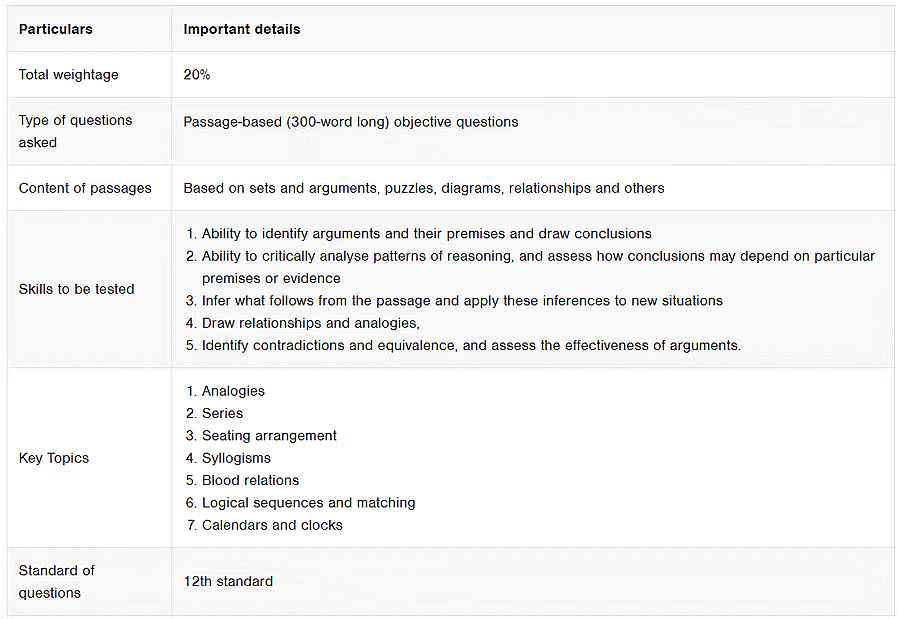
At EduRev, we have compiled all the topics that you should be familiar with for the Logical Reasoning portion for CLAT.
5. Quantitative Techniques
The Quantitative Techniques section of the UG-CLAT 2026 will include short sets of facts or propositions, or other textual representations of numerical information, followed by a series of questions. You will be required to derive information from the passages or questions, and apply mathematical operations on such information.
The questions will require you to:
- Derive, infer, and manipulate numerical information set out in such passages; and
- Apply various 10th standard mathematical operations on such information, including from areas such as ratios and proportions, basic algebra, mensuration and statistical estimation.
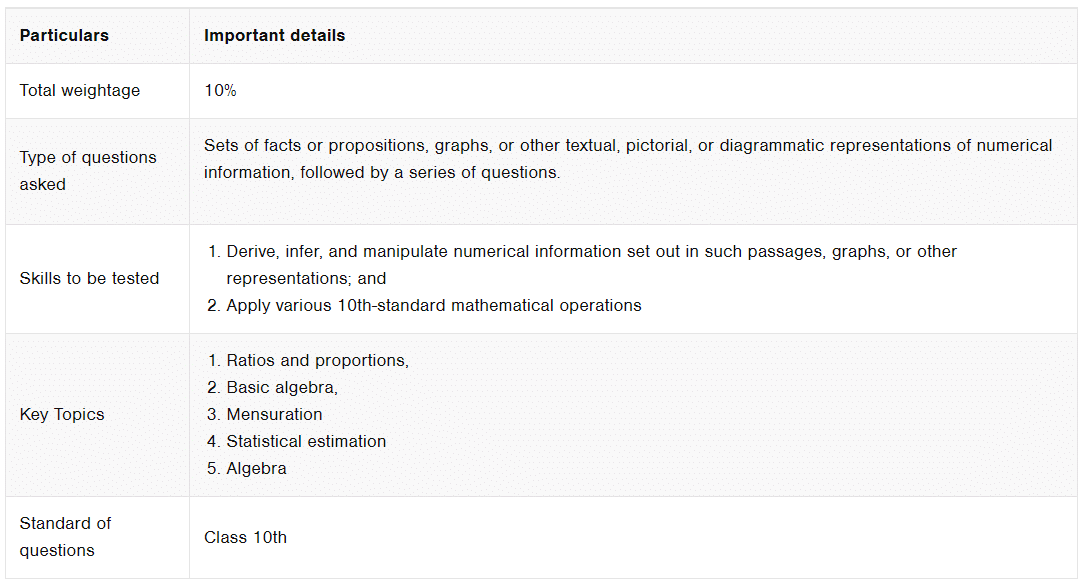
At EduRev, we have compiled all the topics that you should be familiar with for the Quantitative Techniques portion for CLAT.
Important Tips for CLAT Exam Preparation
Here are some important tips to keep in mind as you prepare for your CLAT exam:
- Question Selection: It's important to keep in mind that all questions in the CLAT carry the same weight and there are no sectional cutoffs! So feel free, to begin with, any section you are familiar with, and feel free to move on if a question is taking too long.
- Negative Marking: The CLAT has a negative marking of +1/-0.25. Therefore, you receive one point for each accurate response and zero points for each incorrect response. Any questions you don't attempt to receive a score of 0. This implies that making wild assumptions carries a cost. You should guess, but carefully. Only when you can rule out at least two of the possible answers to the question does it make sense to guess. So, when making a guess, keep that in mind.
- English: You'll get a lot farther in the English section if your reading comprehension and fundamental grammar skills are strong. The CLAT traditionally favours para jumbles, so don't forget to practise them as well.
Now after going through the syllabus, are you wondering how to study a particular subject?
Don’t worry EduRev has a fool-proof strategy for YOU to crack the exam with the mantra “Study What Matters!”
Additional Links:
| Mock Test Series for CLAT | How to Prepare for CLAT | Current Affairs & General Knowledge |
| CLAT Past Year Papers | English for CLAT | Legal Reasoning for CLAT |
|
3 videos|17 docs
|





















